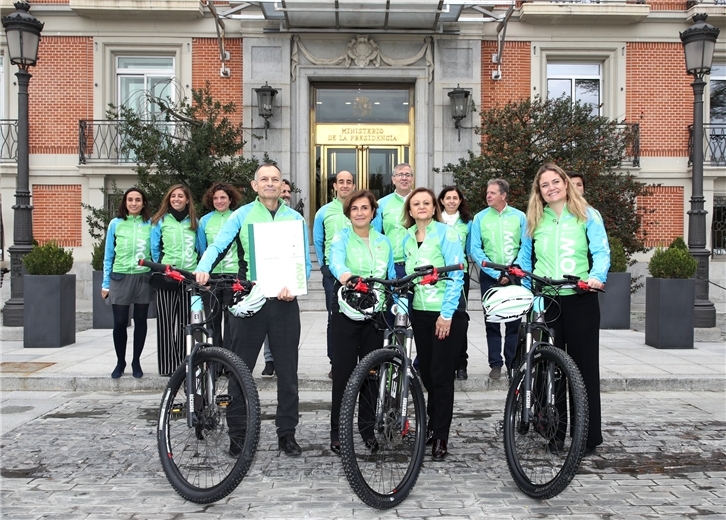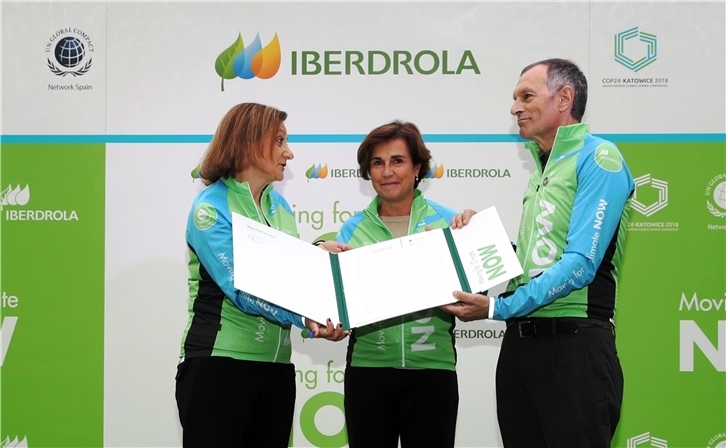News
The third Moving for Climate NOW focuses on the Talanoa Dialogue, created to facilitate the participation of governments and civil society in implementing the Paris Agreement
Moving for Climate NOW starts its journey to COP 24 by delivering its Manifesto against climate change to Cristina Gallach
- The Spanish government's High Commissioner for Agenda 2030 received Iberdrola, as represented by the CEO of Iberdrola Spain, Ángeles Santamaría, and the Spanish United Nations Global Compact Network, represented by its vice-president, Víctor Viñuales, as promoters of the initiative
- The Manifesto advocates a just transition that pays special attention to vulnerable communities without leaving anyone behind and in which the energy sector plays a fundamental role, contributing to the development of a model based on clean energy, sustainable mobility and energy efficiency
- Moving for Climate NOW comprises over 40 people from different countries and organisations that will pedal more than 600 kilometres with the aim of making society aware of the need to urgently act against climate change using all available mechanisms
The cycling team of Moving for Climate NOW, an initiative promoted by the Spanish United Nations Global Compact Network and Iberdrola, has been received this morning at the Moncloa Palace by the Spanish government's High Commissioner for Agenda 2030, Cristina Gallach. During the meeting, the participants presented Gallach with the Manifesto they will take to the Climate Summit (COP 24) to be held from 2 to 14 December in Katowice (Poland).
The CEO of Iberdrola España, Ángeles Santamaría, and the Spanish United Nations Global Compact Network vice-president, Víctor Viñuales, were present at the event, as representatives of the organisations promoting this initiative, which is now on its third iteration.
Ángeles Santamaría affirmed that "the energy transition towards decarbonisation will require everyone to contribute, along with courage in decision making, constancy in execution and sensitivity towards vulnerable communities, so as not to leave anyone behind. It's technically and economically possible, it's an opportunity and, moreover, there's a demand from society that demands future answers.
For his part, Víctor Viñuales explained that "climate is one of the pillars of the United Nations Agenda 2030 and it is a challenge that we cannot face individually. Collective action through alliances reinforces our chances of success, so our goal with this initiative is to expand the level of commitment reached to the largest possible number of stakeholders”.
The vice-president of the Spanish United Nations Global Compact Network added that "to contribute to the Sustainable Development Goals (SDG), we need collective action, government commitment, private sector drive, awareness and metrics".
Moving for Climate NOW brings together over 40 participants from different countries and organisations, who will travel more than 600 kilometres by electric bicycle with the common objective of making society aware of the need to act urgently against climate change using all the mechanisms available.
The bicycle rally will depart from Vienna on Monday, 26 November, and pedal to Katowice (Poland), the city that hosts this year's Climate Summit, where they will arrive on Sunday 2 December.
Upon arrival, the members of Moving for Climate NOW will deliver the initiative's Manifesto to the United Nations Executive Secretariat for Climate Change. The document focuses on the Talanoa Dialogue, a space for conversation designed to encourage the participation of governments and civil society, with the aim of taking stock of the joint work carried out so far to achieve the climate objectives agreed at the Paris Summit in 2015. Iberdrola is the only Spanish company and the only energy company taking part in the debates in the technical phase of this Dialogue.
The Moving for Climate NOW Manifesto states that "the Katowice Climate Summit is going to be very important because now is the time to finalise the main elements of the Paris Agreement and implement the conclusions of the Talanoa Dialogue to inform future climate action, also taking into account the conclusions and guidelines of the IPCC special report on the impacts of global warming of 1.5 oC and the magnitude of the measures required".
It also calls for a just transition that pays special attention to vulnerable communities and leaves no one behind, and in which the energy sector plays a key role, contributing to the development of a model based on clean energy, sustainable mobility and energy efficiency.
The third ‘Moving for Climate NOW’
Moving for Climate NOW is now in its third iteration, after pedaling to the Marrakech Climate Summit in 2016 (COP 22) and Bonn in 2017 (COP 23).
This time, the cycle rally will depart from Vienna (Austria) on Monday 26 November and arrive in Katowice (Poland) on Sunday 2 December, after travelling more than 600 kilometres on electric bicycles.
The team is made up of over 40 people from different organisations and countries, in line with UN Agenda 2030 SDG 17 (partnerships to achieve the goals). In this third Moving for Climate NOW the cycling team will be joined by representatives from associations such as the International Energy Agency (IEA) and the International Renewable Energy Agency (IRENA), government bodies such as the Spanish Office for Climate Change and the Biodiversity Foundation, initiatives such as Sustainable Energy for All (SEforALL) and the International Institute for Sustainable Development (IISD), non-governmental organisations such as ActionAid and The Climate Reality Project and university centres such as the Pontificia Comillas University and the Federal University of Rio de Janeiro, among others. As on previous occasions, the rally will comply with gender parity, in line with compliance with SDG 5.
The Spanish United Nations Global Compact Network
The United Nations Global Compact is the biggest voluntary corporate sustainability initiative in the world. It has two objectives: on the one hand, to implement 10 universally accepted principles to promote corporate social responsibility (CSR) in the areas of human rights, labour standards, the environment and the fight against corruption in companys' activities and strategies. And on the other hand, to get the private sector to contribute to the objectives of the United Nations, currently the Sustainable Development Goals (SDG).
At the international level, it has over 13,000 signatories. In Spain, it has more than 2,600 signatories, which makes it the country with the largest presence in the initiative.
The Global Compact is working for sustainable development through multistakeholder and public-private alliances. As a United Nations initiative, it pursues the organisation's development goals, the main one being the fight against climate change, which is essential for the development of people, societies, the planet, prosperity and justice.
About Iberdrola
Iberdrola is a global energy leader, the number one producer of wind power, and one of the world’s biggest electricity utilities by market capitalisation. The group is present in numerous countries and supplies energy to over 100 million people mainly in Spain, the United Kingdom (Scottish Power), the USA (AVANGRID), Brazil (Neoenergia) and Mexico. With a workforce of 34,000 and assets in excess of €110 billion, it posted revenues of over €31.263 billion and a net profit of €2.804 billion in 2017.
Iberdrola is leading the transition towards a sustainable energy model through investments in renewable energy, smart grids, large-scale energy storage and digital transformation, offering the most advanced products and services to its customers. Thanks to its commitment to clean energy, Iberdrola is one of the companies with the lowest emissions and an international benchmark for its contribution to the fight against climate change and for the sustainability of the planet.
Almost two decades ago, Iberdrola realised that climate change was a real challenge for humanity that required urgent action. It also realised that the electricity sector was key to providing solutions to combat this global problem.
In this context, a few years ago Iberdrola launched its Action Plan on Climate Change, which focuses on four main areas: playing a leading role in major international organisations and business coalitions, active involvement in international negotiations on the United Nations Framework Convention on Climate Change, implementation of a Social Awareness Plan with internal and external measures and implementation of internal actions for climate change mitigation and adaptation.
The High Commissioner for Agenda 2030
Under the direct authority of the president of the government, a high commissioner for Agenda 2030 has been created, with the rank of undersecretary, who is responsible for coordinating actions to comply with the United Nations Agenda 2030 and, in particular, to carry out the following functions:
a) Monitor the actions of the competent bodies in the General State Administration in fulfilling the objectives of sustainable development and Agenda 2030.
b) Promote the preparation and implementation of the plans and strategies necessary for Spain to comply with Agenda 2030.
c) Evaluate, verify and disseminate the progress made in meeting the objectives of Agenda 2030.
d) Collaborate with the Ministry of Foreign Affairs and Cooperation in Spain's international dialogue on the global implementation of Agenda 2030.e) Promote the development of the information and statistical systems necessary to accredit progress in achieving the objectives of Agenda 2030.
Society as a whole is called upon to participate in order to achieve the 17 Sustainable Development Goals: central government, regional and local governments, civil society and the private sector, in order to fulfil the new global social contract without leaving anyone behind. A Spain that has achieved the SDG by 2030 will be the country we all dream of. For this reason, Agenda 2030 is already at the centre of our vision for state and government action. It represents a way of acting in the world.








